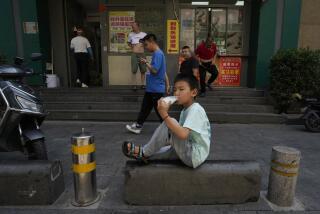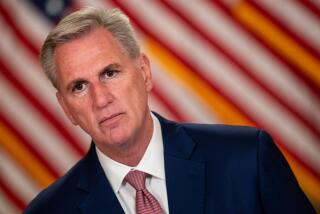China’s lawmakers to focus on rescuing a sliding economy
- Share via
SHANGHAI — China’s annual legislative session opened today with the premier, Wen Jiabao, outlining an aggressive plan of increased stimulus measures to keep the economy growing rapidly and maintain social stability.
In addressing the nearly 3,000 delegates of the Communist Party-controlled National People’s Congress, Wen said the central government would boost spending on healthcare and other social programs, and take additional steps to offset the rising unemployment resulting from the global financial crisis. But he did not specify new spending on top of the $586-billion stimulus package announced in November.
China’s economy, the largest after those of the U.S. and Japan, has slowed sharply amid plunging exports, putting about 20 million laborers out of work and raising the risk of massive social unrest.
“We are facing unprecedented difficulties and challenges,” he said in delivering a 44-page text of his working report.
As expected, Wen set a target economic growth rate of 8% for this year, a figure that economists see as a minimum to create enough jobs. China’s economy expanded 9% last year, down from 13% in 2007. But growth in the latest fourth quarter slid to 6.8% year over year, and some analysts project a similar rate for all of 2009.
In recent days there have been rays of hope, as measures of China’s industrial production such as power generation have moved in a positive direction. Those reports, plus expectations that the two-week legislative session would yield more stimulus measures, triggered a 6.1% surge in Chinese stocks Wednesday, the biggest gain in nearly four months.
But investors apparently expected Wen to reveal a ramp-up in the economic stimulus package. After Wen’s speech, Shanghai’s composite index fell into negative territory early Thursday afternoon, after rising nearly 2% in the morning.
Zhang Hanya, a researcher at an institute under the National Development and Reform Commission, the government’s top economic planning agency, said after listening to Wen’s remarks that it was still possible that the stimulus plan would been enhanced.
China, unlike the U.S., has the wherewithal to increase its fiscal spending. Wen said the government’s budget deficit this year would be about 3% of China’s economy, compared with more than 12% for the U.S.
“It’s a clear signal that government will increase investment in construction and people’s livelihood,” Zhang said of China’s increased budget deficit from a year earlier.
Wen’s address, however, didn’t specify details of the $586-billion stimulus package, something that many have called for. It remains unclear how much of the package includes previously existing projects and how the money will be channeled.
A vice minister of the National Development and Reform Commission pledged this week to release more details. The commission also is sending teams of inspectors to local areas to monitor expenditures.
But Du Guang, 80, a former director with the Central Party School, an elite training institution, said he doubted Beijing could effectively supervise local spending. He said a major hindrance was the lack of a free media and other institutions that he and others regard as crucial in providing accountability for economic programs and broader social development. Du and 15 other former party elders expressed these and other concerns in a letter to China’s leadership.
Other analysts have criticized the stimulus package for its heavy focus on infrastructure works such as highways and railroads -- capital-intensive projects that are not large job generators. Only a tiny fraction of the funds are earmarked for healthcare, housing and other social programs.
China’s weak social safety net is seen as a primary reason for the nation’s high savings rate and the relatively small role that consumer spending plays in economic growth. Now with the nation’s exports flattened by the global downturn, economists see this time as a chance to push for a restructuring of the economy to rely more on domestic components.
In his address, Wen said China would seek to boost domestic demand and further stimulate consumer spending. The government has introduced programs to subsidize rural residents’ purchases of appliances and cars.
Mao Yushi, a prominent economist in Beijing, said he hoped the legislative session would provide a forum to carefully consider which policy was best to cope with the economic crisis. He contended that the government’s current approach was misguided.
“The government is targeting the economic growth rate,” Mao said. “But another target is more important -- employment. The government should help businesses create jobs, eliminate barriers on job creation, not just help businesses increase production.”
To realign China’s economy, Mao said, officials should loosen the government’s monopolistic hold on sectors such as energy, telecommunications and financial services. That would open up the market to enterprises and spread the wealth to the private sector.
--
More to Read
Inside the business of entertainment
The Wide Shot brings you news, analysis and insights on everything from streaming wars to production — and what it all means for the future.
You may occasionally receive promotional content from the Los Angeles Times.











